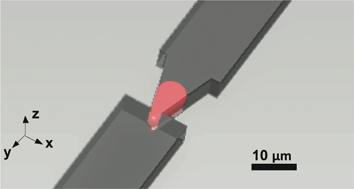Microfluidic micropipette aspiration for measuring the deformability of single cells
Abstract
We present a microfluidic technique for measuring the deformability of single cells using the pressure required to deform such cells through micrometre-scale tapered constrictions. Our technique is equivalent to whole-cell micropipette aspiration, but involves considerably simpler operation, less specialized equipment, and less technical skill. Single cells are infused into a microfluidic channel, and then deformed through a series of funnel-shaped constrictions. The constriction openings are sized to create a temporary seal with each cell as it passes through the constriction, replicating the interaction with the orifice of a micropipette. Precisely controlled deformation pressures are generated using an external source and then attenuated 100 : 1 using an on-chip microfluidic circuit. Our apparatus is capable of generating precisely controlled pressures as small as 0.3 Pa in a closed microchannel network, which is impervious to evaporative losses that normally limit the precision of such equipment. Intrinsic cell deformability, expressed as cortical tension, is determined from the threshold deformation pressure using the liquid-drop model. We measured the deformability of several types of nucleated cells and determined the optimal range of constriction openings. The cortical tension of passive human neutrophils was measured to be 37.0 ± 4.8 pN μm−1, which is consistent with previous micropipette aspiration studies. The cortical tensions of human lymphocytes, RT4 human bladder cancer cells, and L1210 mouse lymphoma cells were measured to be 74.7 ± 9.8, 185.4 ± 25.3, and 235.4 ± 31.0 pN μm−1 respectively. The precision and usability of our technique demonstrates its potential as a biomechanical assay for wide-spread use in biological and clinical laboratories.


 Please wait while we load your content...
Please wait while we load your content...